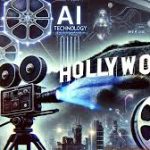Introduction
The entertainment industry has always thrived on innovation, from the introduction of sound in cinema to the rise of digital streaming platforms. But in 2025, artificial intelligence (AI) is pushing the boundaries of creativity, production, and celebrity culture like never before. From AI-generated scripts to virtual pop stars, the lines between technology and artistry are blurring.
At TechTalkDesk.com, we explore how AI is reshaping film, music, and celebrity culture in 2025, highlighting both opportunities and challenges in this rapidly evolving digital landscape.
AI in Film Production
Hollywood and global cinema are increasingly embracing AI in nearly every stage of production. AI algorithms analyze audience preferences to predict which themes and genres will succeed at the box office. Studios are using AI-powered script generators to help writers draft storylines, while advanced CGI systems enhance visual effects in real time.
In 2025, directors are even collaborating with AI “co-creators” to design sets, characters, and plot twists. For example, AI-assisted editing reduces months of post-production work into weeks, helping filmmakers release movies faster without compromising quality.
However, the question arises: Can AI truly replace human creativity, or should it remain a supportive tool?
AI and the Music Industry
The music world has been transformed by AI, with software capable of composing songs, mixing tracks, and even mimicking the voices of famous artists. In 2025, AI-driven platforms allow musicians to experiment with new sounds while reaching wider audiences.
AI is also helping record labels predict the next big hit by analyzing global streaming data, listener habits, and cultural trends. Virtual artists like AI-generated singers are topping charts, creating a new type of celebrity who never ages, tours globally through VR concerts, and interacts with fans 24/7.
Yet, human musicians argue that AI lacks emotional depth, sparking debates about authenticity in art.
AI and Celebrity Culture
Celebrity culture has also been redefined in the age of AI. Virtual influencers powered by AI dominate platforms like Instagram, TikTok, and YouTube, securing brand deals and millions of followers. These AI-generated celebrities are flawless, always available, and capable of appealing to multiple demographics simultaneously.
Meanwhile, real-life celebrities are using AI to engage fans. Chatbots powered by AI allow stars to “talk” directly to millions of fans daily. Personalized AI assistants generate social media posts, manage fan clubs, and even create digital merchandise.
This shift raises ethical concerns: Are fans being misled when they interact with AI versions of their favorite stars?
Deepfake Technology in 2025
One of the most controversial AI tools in entertainment is deepfake technology. In 2025, filmmakers are using deepfakes to de-age actors, recreate deceased performers, or cast digital doubles. While this opens creative opportunities, it also sparks debates around consent and intellectual property.
For example, audiences have mixed reactions when seeing late icons “revived” on screen. Supporters celebrate the technology as a tribute, while critics argue it exploits legacies. Regulations are now being introduced to protect performers’ digital likeness rights.
AI in Streaming and Personalized Entertainment
Streaming platforms like Netflix, Spotify, and Disney+ rely heavily on AI to personalize user experiences. In 2025, AI recommendation systems go beyond suggesting movies or songs; they now create personalized trailers, playlists, and even interactive shows where storylines adapt to viewer choices in real time.
This personalization keeps audiences engaged, but it also creates concerns about echo chambers—viewers may only see content aligned with their tastes, limiting exposure to diverse cultural experiences.
AI-Generated Content and Audience Engagement
Beyond production, AI is creating new forms of fan engagement. Interactive holograms and VR concerts powered by AI are becoming mainstream. Fans can attend live events from their living rooms, interacting with AI-generated avatars of celebrities in real time.
For example, AI-driven concerts by virtual artists attract millions of global viewers simultaneously, reshaping the very definition of stardom. At the same time, real-world celebrities are embracing AI-enhanced fan experiences to maintain relevance in this new era.
Challenges and Ethical Concerns
The rise of AI in entertainment presents several challenges:
-
Authenticity: Can AI-generated music, films, and celebrities truly evoke human emotion?
-
Copyright Issues: Who owns an AI-generated song or script—the programmer, the artist, or the AI itself?
-
Job Security: Screenwriters, musicians, and even actors fear being replaced by machines.
-
Manipulation Risks: Deepfake technology could spread misinformation or damage reputations.
The industry faces a delicate balance: embracing AI’s benefits while protecting human artistry and rights.
Opportunities Ahead
Despite challenges, AI brings exciting opportunities. Smaller studios and independent artists now have access to affordable AI tools that once required massive budgets. This democratization of technology allows diverse voices to emerge, breaking traditional barriers in entertainment.
Moreover, fans are experiencing unprecedented levels of personalization and interactivity. The boundary between celebrities and their audiences is fading, creating more immersive and meaningful connections.
FAQs
Can AI create entire movies or songs without human input?
Yes, in 2025, AI can generate complete films and songs. However, most successful projects still involve human-AI collaboration for authenticity.
Are virtual celebrities replacing real ones?
Not entirely. Virtual celebrities are rising, but human stars still hold emotional connections that AI cannot fully replicate.
How is AI used in streaming platforms?
AI powers recommendations, creates personalized playlists, and even develops interactive content that adapts to viewer preferences.
What are the risks of deepfake technology in entertainment?
Deepfakes raise concerns about consent, intellectual property, and the potential misuse of digital likenesses.
Will AI take away jobs from artists and entertainers?
AI may replace some roles, but it also creates new opportunities in AI-assisted creativity, digital production, and fan engagement.
Conclusion
In 2025, AI is not just a backstage tool—it’s a headline act in the entertainment industry. From film production and music creation to celebrity culture and fan engagement, AI is reshaping the way we create and consume art.
While questions of authenticity, ethics, and human creativity remain, one thing is clear: the fusion of AI and entertainment is here to stay. The challenge lies in ensuring that technology enhances, rather than replaces, the magic of human expression.
At TechTalkDesk.com, we see AI in entertainment as both a disruptor and a collaborator—one that will continue to redefine how we view celebrities, art, and the cultural landscape in the years ahead.








